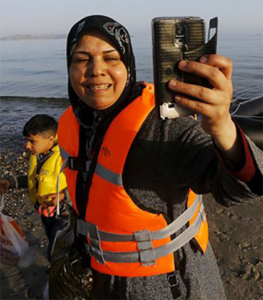Migration and mobile technology
Mobile technology has emerged as a key tool for refugees fleeing conflict, persecution or poverty, researchers say.

Mobile phones, especially, are vital for helping people not only to keep in touch with family and friends but to guide refugees on their difficult paths to the countries where they are relocating.
According to Meghan Benton, a senior analyst at the Washington-based Migration Policy Institute, even the poorest of migrants are using technology to help them on their journeys.
Dr Benton, who specialises in migration and technology, says smartphones in particular are shaping migration journeys, and many migrants value a smartphone more than food, water and other basic necessities.
Before smartphones became widely available about a decade ago, migrants had almost no control over their journeys, she says.
“Access to information and resources was limited, and migrants often were uncertain they’d ever see their families again,” Dr Benton said.
“The smartphone changed that. The access to information and ability to stay in touch with family and friends back home empowers migrants and gives them a sense of security, a sense of control,” he said.
A downside migrants face using technology is access to too much information, but Dr Benton said this is what empowers them.
She says that although misinformation is spread easily, migrants can choose what information they want to trust and fact-check rather than having to believe what they hear from the only source available to them at the time.
A recent study shows that of the Venezuelan exiles who walked more than 3,200 kilometres through Colombia and Ecuador to reach Peru hundreds often turned to bloggers and vloggers to share their experiences and give advice for migration.
Numerous “Venezolanos en Perú” Facebook groups have hundreds of thousands of members, and there are hashtags that connect Venezuelans on Twitter and Instagram, the study found.
Buses, the principal means of transportation for many, are equipped with Wi-Fi and ways to charge electronic devices, allowing migrants to update friends and family about their journeys or to look for places to stay and work in their new country, it found.
One Facebook group attracted 750,000 members and while people would post advice, housing options and job opportunities, as the group grew, so did the number of trollers and misinformation forced the deletion of the group.
Hazel Kwon, an assistant professor at Arizona State University whose research focuses on online communities, says digital communication, especially hashtags, play a big role in mobilising communities in crisis.
When a community in crisis communicates online, first there is panic, followed by rumour mongering and hashtags that are confusing and not helpful, Prof Kwon said.
“Digital communities don’t really look that helpful to deal with the situation because it will aggravate the anxiety. But these online communities are resilient,” she said, adding that in crisis, these communities transform themselves from being messy to systematic,” she said.
Prof Kwon said the hashtag becomes a core theme to develop new information sharing and discourse, “so there will be a shared way in dealing with the situation.”
Laurie Nowell
AMES Australia Senior Journalist












